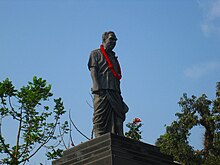A. K. Gopalan
This article includes a list of general references, but it lacks sufficient corresponding inline citations. (August 2011) |
A. K. Gopalan | |
|---|---|
 AKG Statue located at Kannur | |
| Former Leader of the Opposition (India) | |
| Constituency | Kasaragod |
| Personal details | |
| Born | Ayillyath Kuttiari Gopalan 1 October 1904 Kannur, Kerala, British India |
| Died | 22 March 1977 (aged 72) Trivandrum Medical College, Kerala, India |
| Political party | Communist Party of India Communist Party of India (Marxist) |
| Spouse | Susheela Gopalan |
Ayillyath Kuttiari Gopalan (1 October 1904 – 22 March 1977), popularly known as A. K. Gopalan or AKG, was an Indian communist leader.
Early life and education
Ayillyath Kuttiari Gopalan Nambiar was born on 1 October 1904 in Peralasseri, Kannur District of Northern Kerala and educated in Tellichery. By the time he became a teacher, India's independence movement was becoming energised by Mahatma Gandhi. Gopalan took part in the Khilafat Movement[1] which prompted a marked change in his outlook, transforming him into a dedicated full-time social and political worker.
Indian National Congress
In 1927 he joined the Indian National Congress and began playing an active role in the Khadi Movement and the upliftment of Harijans. He was arrested for participating in the salt satyagraha in 1930.
While in prison he got acquainted with communism and became a member of the Congress Socialist Party and later the Communist Party of India when it finally took shape in Kerala in 1939. He led the hunger march from Malabar region to Madras in 1936 and the Malabar Jatha in support of the movement for responsible government in Travancore.
Further arrest

The outbreak of the Second World War in 1939 prompted an upsurge in activism against British domination, and Gopalan was again arrested. But in 1942 he escaped from prison and remained at large till the end of the war in 1945. He was arrested again shortly after the end of the war and was still behind bars when India became independent on 15 August 1947. He was released a few weeks later. Thereafter he was a member of Lok Sabha for 5 consecutive terms till his death on 22 March 1977 and became the first leader of opposition in the parliament of India.
During the Sino-Indian war in 1962, AKG along with other Indian communists like E.M.S. took an impartial view and requested both nations to discuss and settle the matter peacefully. The official leadership of the party at that time denounced this and supported the India Government. Many leaders of the left group were arrested with the support of the leadership of the party. When the party leadership blocked the publication of an article written by then General Secretary EMS condemning government for attacking the left leaders in the party using the cover of the war, he himself quit the post and supported the left group. AKG was part of the left group and faced disciplinary action by the party leadership dominated by the right. During this time a newspaper published a letter allegedly written by rightist leaders S.A Dange to the British during the freedom struggle. In this letter he promised to keep away from the freedom struggle if granted bail. This was used by the left group to beat the right. When the demand of the left to set up a party-level inquiry about the alleged letter of S.A Dange was rejected in the National Council of CPI, the left group walked away and formed a new Party.
AKG joined the new break away faction, which later came to be known as Communist Party of India (Marxist). He also wrote extensively. His autobiography In the Cause of the People has been translated into many languages. His other works include For Land, Around the World, Work in Parliament, and Collected Speeches, all in Malayalam.
Indian Coffee House
AKG played an important role in the formation of Indian Coffee House, a worker cooperative initiative by organising the thrown out employees of Coffee Houses of Coffee Board to establish ICHs in late 1950s. His contribution is documented in Coffee Housinte Katha, a Malayalam alternative history book by Nadakkal Parameswaran Pillai the founder of ICHs in Kerala with the Communist Leader of Thrissur Advocate T. K. Krishnan.[citation needed]

In popular culture
Shaji N. Karun, a prominent film director of Kerala, made a biopic on AKG titled AKG — Athijeevanathinte Kanalvazhikal. The film used a part-documentary, part-fiction format. It was released in theatres across Kerala on August 2008.[2]
See also
Notes
- ^ FreeIndia.org
- ^ "Film on AKG set for release tomorrow". The Hindu. Chennai, India. 8 August 2007.
References
- Manini Chatterjee, People's Democracy. "A K Gopalan: From Satygrahi To Revolutionary".
- B.T. Ranadive, People's Democracy. "IN MEMORY OF A K GOPALAN".
- Ganashakti Newsmagazine. "Remembrance: A. K. Gopalan".
- K.P. Pushparaj, The Hindu (2 May 2004). "Fresh faces make prediction impossible". Chennai, India.
External links
- Indian independence activists from Kerala
- Indian National Congress politicians from Kerala
- Trade unionists from Kerala
- Communist Party of India (Marxist) politicians from Kerala
- Communist Party of India politicians from Kerala
- 1904 births
- 1977 deaths
- Indian atheists
- Malayali politicians
- Politicians from Kannur
- 1st Lok Sabha members
- 2nd Lok Sabha members
- 3rd Lok Sabha members
- 4th Lok Sabha members
- 5th Lok Sabha members
- Lok Sabha members from Kerala
